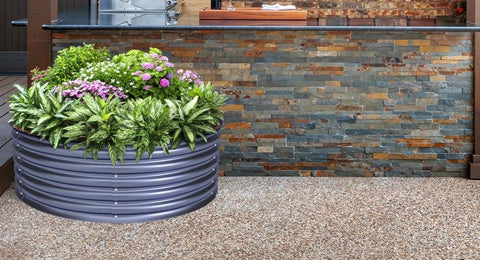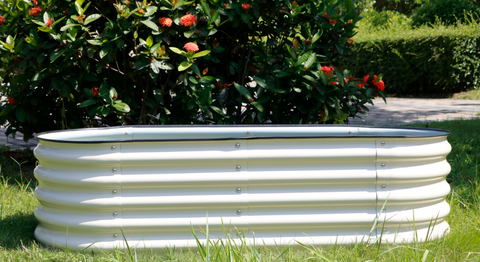Knowledge from Olle Garden Bed: Pros and Cons of Using Epsom Salt in the Garden
Epsom (magnesium sulfate) is a mineral compound used in gardens to help plants and lawns grow better. Gardeners also use Epsom Salt to promote the growth of tomatoes, roses, peppers, carrots and citrus trees. The following content also has some reference value for raised garden beds.
Epsom salt is a compound rich in magnesium, which may help promote plant growth, improve nutrient absorption, make plants greener, or even prevent pests. Epsom salt has a neutral pH value, so it will not affect the pH value of your garden soil.
Although laxative salt is popular in gardening, it is not without its critics. Some people say that this salt has no effect on plants and will not make plants greener. In addition, the use of Epsom as fertilizer is ineffective because it does not contain nitrogen, phosphorus and potassium.

What is the truth about using salt in your garden? What are the advantages and disadvantages of using this natural mineral to promote plant growth?
Is Epsom Salt Good for Plants?
Yes, if the soil is deficient in magnesium (Mg), Epsom is good for plants. If this mineral is lacking, adding magnesium to the ground can help plants grow better.
The researchers say that magnesium is a secondary nutrient necessary for optimal plant growth. Sometimes, chemical imbalance, poor soil or soil rich in magnesium plants will lead to low magnesium content. In these cases, the addition of magnesium compounds, such as cathartic salts, may help the plant to address any deficiencies.
According to the University of Minnesota, magnesium deficiency occurs in acid loamy soil. However, in many gardens and backyards, lack of magnesium is usually not a problem.
What effect does purgative salt have on plants?
Epsom salt or magnesium sulfate can promote the healthy growth of plants. Magnesium helps plants produce chlorophyll, a substance crucial to photosynthesis, which provides energy and green for plants. Magnesium enables plants to flower and absorb important nutrients, such as phosphorus and nitrogen. Adding Epsom salt can solve the problem of soil magnesium deficiency.
Epsom salt can promote plant growth
Since magnesium is essential to plant growth, the addition of Epsom salts may help promote plant growth. Photosynthesis not only makes plants green; It provides energy for plants to grow and produce flowers and fruits, and magnesium is essential for this process. Plants growing in poor soil can benefit from magnesium sulfate in Epsom.
The addition of Epsom salts can help correct magnesium deficiency in some soil types. Garden soils with little organic matter are more susceptible to magnesium deficiency. Epsom can also help acidic soils and soils with high potassium content, because these soil types reduce magnesium absorption.
Epsom salt can provide some plant micronutrients
Epsom salts contain two micronutrients that many plants need magnesium and sulfur. Some plants, such as tomatoes, roses, potatoes, peppers, carrots and citrus trees, need adequate levels of magnesium in the soil. If you have acidic or loamy soil, these types of plants can benefit from salt sluicing.
Of course, each plant has different nutritional requirements, and not all plants benefit from salt purging. For example, beans and leafy vegetables grow in soils with low magnesium content. Therefore, the use of Epsom salts as fertilizer for these plants will not have any impact on plant growth.
Salting can improve plant nutrient absorption
The magnesium content of Epsom salts can help plants absorb essential nutrients, such as nitrogen and phosphorus. Plants lacking magnesium will be under pressure to absorb the nutrients needed for growth. The use of Epsom salts to address magnesium deficiency will result in normal nutrient absorption.
However, it is best to remember that Epsom salts are only beneficial to plants with magnesium deficiency. If you have healthy and balanced soil, adding Epsom will not increase nutrient absorption beyond its standard limit.
Epsom salt can prevent pests on plants
Gardeners believe that Epsom salts can stop pests and even kill them in contact. The best way to kill garden bugs is to sprinkle salt around the plant base or make salt spray solution. However, there is only anecdotal evidence of the effectiveness of Epsom as a natural insecticide.
Does Epsom Salt Make Plants Greener?
Yellowing leaves may be a sign of magnesium deficiency, which is most common in citrus trees and ornamental plants.
Many gardeners believe that the use of Epsom salts in gardens can help plants grow greener leaves. If your soil lacks magnesium, this may be true. Magnesium is essential for the production of chlorophyll, which is a green pigment used for photosynthesis. However, if you have enough magnesium in your soil, using Epsom will not make any difference.
Can Epsom Salt Neutralize Soil pH?
Epsom does not change the pH of the soil because it is neither acidic nor alkaline. The neutral pH of Epsom is 7.0, which will not make the soil more acidic or alkaline.

How to Apply Epsom Salt to Plants
Using Epsom Salt in your garden can help plants that need a lot of magnesium, such as peppers, roses, and tomatoes.
To apply Epsom Salt to plants, dissolve 1-2 tablespoons Epsom Salt in 1 quart (1 liter) of water and irrigate the plants for healthy growth. You can also sprinkle 1 tablespoon of salt granules around the base of plants such as tomatoes or peppers to increase the magnesium content. After application, fully water.
You can also spray Epsom Salt as a leaf spray by dissolving 1 tablespoon of Epsom Salt per gallon of water. Spray the laxative fertilizer directly on the leaves of the plant.
Before using Epsom salts on plants, it is best to remember that not all plants benefit from the addition of magnesium. Therefore, before using Epsom as fertilizer, please check the type of crop you want to grow.
In addition, in magnesium rich soils, the addition of Epsom salts has little benefit because there is no nutritional deficiency to be addressed. If you believe that salt sluicing is beneficial to your garden, please conduct a soil test to see if there are any soil defects.
When not to use Epsom for plants
Under certain conditions, Epsom salts can be useful fertilizers in gardens. However, it is not an all powerful magic plant fertilizer for all situations. Do not use Epsom instead of ordinary fertilizer, because it lacks important plant nutrients. You do not need to use Epsom in soils that already have high magnesium content. Crops and flowering plants that grow fine in soils with low magnesium content do not need salt.
Plant Epsom – Conclusion
Salts used in gardens can be an excellent soil conditioner for solving magnesium deficiency. Magnesium is an important component of healthy plants, which is necessary for photosynthesis, nutrient absorption and plant growth. However, plant Epsom only works in the presence of magnesium deficiency.
